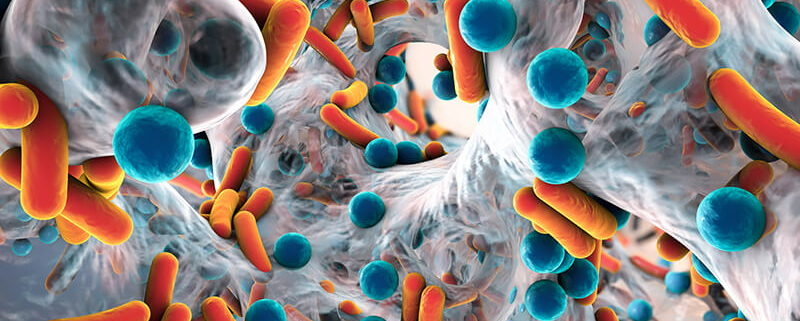Intestinal health
There is an organ of the human body that is little known but of vital importance, located in the intestine, weighing one kilo, formed by trillions of microorganisms – as many as 10 times the number of our cells; an organ in constant transformation, whose balance influences our health to a massive extent. This organ, formerly known as intestinal flora, is nowadays called ‘microbiota’.
If it is altered, a phenomenon known as intestinal ‘dysbiosis’, it triggers numerous disorders and conditions that are typical of our times.
Restoring the balance and health of the microbiota and of the entire intestinal ecosystem requires opting for a balanced diet and, in many cases, taking nutritional supplements, phytocomplexes and probiotics.
Prebiotics, Probiotics, Symbiotics
A balanced microbiota needs a good diet, a healthy lifestyle and the introduction of bacteria and preparations that promote its life.
The most important criteria for a diet that helps the microbiota thrive must foresee dietary fibre content, the quality and composition of foods, their content in probiotics and the absence of poisons (preservatives, colourings, sweeteners).
Restoring the balance of the intestinal ecosystem requires, in many cases, taking live lactic bacteria or probiotics in the form of supplements.
Since bacteria act together as a group, a probiotic mix is used to regularise the microbiota.
Extensive research has shown a certain beneficial effect of probiotics in some conditions, as a barrier against pathogenic enterobacteria, reducing the symptoms related to lactose intolerance, preventing diarrhoea in children, preventing and treating diarrhoea, reducing atopic eczema, increasing the effectiveness of the immune system.
Prebiotics are indigestible foods that promote the growth and activity of beneficial intestinal bacteria. The main prebiotics are mostly soluble dietary fibre, such as inulin and lactoferrin.
The term Probiotics, of Greek origin (‘pro bios’, ‘that favours life’), introduced in 1965 by the veterinarians Lilly and Stillwell, is used to describe live and viable microorganisms that have a beneficial effect on health, by balancing the microbiota.
The term Symbiotics is used to describe supplements in which probiotics and prebiotics are used in combination to promote the development of a protective bacterial flora by taking advantage of their synergic action.

 Specchiasol
Specchiasol



 Specchiasol
Specchiasol Specchiasol
Specchiasol